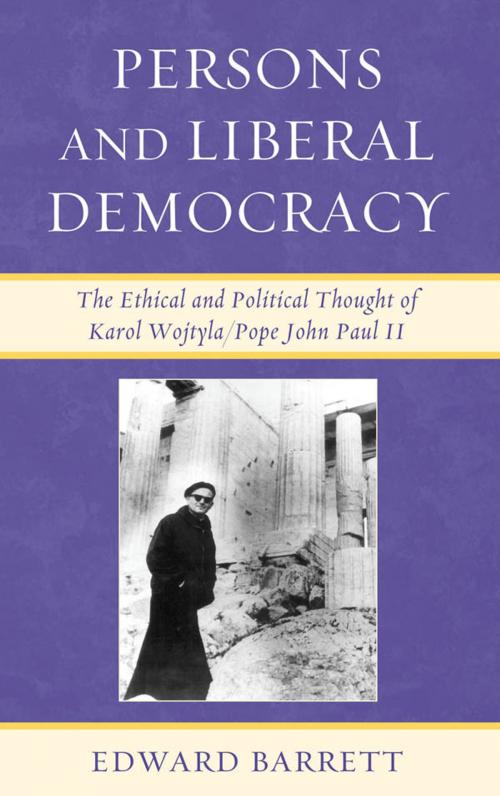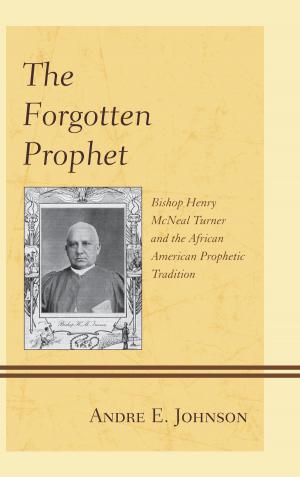Persons and Liberal Democracy
The Ethical and Political Thought of Karol Wojtyla/John Paul II
Nonfiction, Religion & Spirituality, Philosophy, Religious, Political, Ethics & Moral Philosophy| Author: | Edward Barrett | ISBN: | 9781461634003 |
| Publisher: | Lexington Books | Publication: | July 17, 2010 |
| Imprint: | Lexington Books | Language: | English |
| Author: | Edward Barrett |
| ISBN: | 9781461634003 |
| Publisher: | Lexington Books |
| Publication: | July 17, 2010 |
| Imprint: | Lexington Books |
| Language: | English |
Fundamentally, Persons and Liberal Democracy is an explication and defense of classical liberalism. It explains the relatively recent shift in the Church's political theory and, in the process, defends what could be deemed a non-statist form of welfare liberalism. After an introduction, the first chapter contextualizes modern Catholic social thought, explaining how the shift to a nuanced endorsement of liberal economic and political thought was initiated by the pragmatic economic and cultural analyses of nineteenth-century social and liberal Catholics. The next two chapters investigate one fruit of the subsequent re-examination of the relationship of Catholicism to modernity: John Paul's qualified acceptance of liberalism for non-circumstantial, ethical reasons appropriated from within the tradition. While the second chapter details the phenomenological, Thomistic, and theological bases of his ethical premises, the third chapter examines the relationship of these premises to the various aspects of his political theory, particularly his theories of human rights and the complementary roles of the state and civil society in securing these rights. Chapters four and five initiate a dialogue between this analysis of John Paul's social thought and influential political theorists. In the fourth chapter, the dialogue is between John Paul and four Catholic interlocutors: theoconservatives, liberation theologians, United States Conference of Catholic Bishops, and British distributists. The fifth chapter brings John Paul and Catholic social thought into conversation with communitarian critics of liberalism and evaluates the relationship of recent thought on civil society and federalism to the principle of subsidiarity. Finally, the conclusion highlights his most significant accomplishments and suggests areas for further development.
Fundamentally, Persons and Liberal Democracy is an explication and defense of classical liberalism. It explains the relatively recent shift in the Church's political theory and, in the process, defends what could be deemed a non-statist form of welfare liberalism. After an introduction, the first chapter contextualizes modern Catholic social thought, explaining how the shift to a nuanced endorsement of liberal economic and political thought was initiated by the pragmatic economic and cultural analyses of nineteenth-century social and liberal Catholics. The next two chapters investigate one fruit of the subsequent re-examination of the relationship of Catholicism to modernity: John Paul's qualified acceptance of liberalism for non-circumstantial, ethical reasons appropriated from within the tradition. While the second chapter details the phenomenological, Thomistic, and theological bases of his ethical premises, the third chapter examines the relationship of these premises to the various aspects of his political theory, particularly his theories of human rights and the complementary roles of the state and civil society in securing these rights. Chapters four and five initiate a dialogue between this analysis of John Paul's social thought and influential political theorists. In the fourth chapter, the dialogue is between John Paul and four Catholic interlocutors: theoconservatives, liberation theologians, United States Conference of Catholic Bishops, and British distributists. The fifth chapter brings John Paul and Catholic social thought into conversation with communitarian critics of liberalism and evaluates the relationship of recent thought on civil society and federalism to the principle of subsidiarity. Finally, the conclusion highlights his most significant accomplishments and suggests areas for further development.















